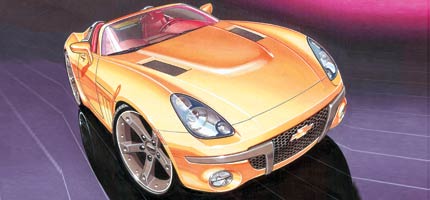You have to ask, from GM's perspective, what is the end result from a six cylinder powered two-seater within the Corvette family and what it is meant to accomplish.
Higher volume, increased sales, brand awareness, broader markets, environmental regulations, less packaging weight, lower insurance premiums, decreased production costs, etc. are all important considerations.
The Corvette has a brand awareness with unique equity, from a naturally aspirated overhead valve small block Chevy, rear drive, and two seats. Headlights are still debated, materials change, and wheels get bigger, but the package says "Corvette" from a mile away.
If we are looking at lower costs, with the supply and demand leading to increased sales, why not dip into the family of engines at a lower displacement. I'm nearing thirty years old, have an older Vette, and me and my wife make decent money, but simply cannot afford a new Vette. If a new 4.8L V8, 285 hp, low-option Vette sold for $30,000 tomorrow, I would write a check PROUDLY, as would many of you reading this.
If gas consumption or emission controls are an issue, displacement on demand, skip shift transmissions, and final drive ratios are technologies presently available to avoid the gas guzzler tax GM is quick to advertise against. And if less 'gadgets' were installed to begin with, the overall weight would decrease, and we all know the advantages of that.
Corvette has a large percentage of customers as repeat customers. Owners are justifiably proud of what the Corvette means to us, its performance, and its appeal on the road. So why would GM consider a six cylinder engine after spending fifty years of development and heritage to be where it is today.
Would you camp out two days to hear a C6-R turbo V6 at speed? This isn't 1985. The Corvette needs to be de-contented, not de-masculinated.

 Cobalt. There's the overpriced SSR. The stupid looking HHR (unless you're delivering milk!). Crappy, gas guzzling Tahoes and Trailblazers. The Silverado-you gotta luv trucks to buy one of these. The Avalanche--nice name that>> a thought: body color the trim GM. It looks like a Tonka toy. The twins--Malibu and Impala. The Aveo--I mean, really. It's a Barcolounger on go-cart wheels. Would you really spend 9k-13k for that death trap!?!!! I saw one hydroplane in normal rainy conditions when an 18-wheeler blew by it. It toppled off the road like a clown car. And last, there's a possible re-worked Camaro. Yeah, saw that. Rework it. That angular look is even going by the wayside for those aneorexic run-way girls.
Cobalt. There's the overpriced SSR. The stupid looking HHR (unless you're delivering milk!). Crappy, gas guzzling Tahoes and Trailblazers. The Silverado-you gotta luv trucks to buy one of these. The Avalanche--nice name that>> a thought: body color the trim GM. It looks like a Tonka toy. The twins--Malibu and Impala. The Aveo--I mean, really. It's a Barcolounger on go-cart wheels. Would you really spend 9k-13k for that death trap!?!!! I saw one hydroplane in normal rainy conditions when an 18-wheeler blew by it. It toppled off the road like a clown car. And last, there's a possible re-worked Camaro. Yeah, saw that. Rework it. That angular look is even going by the wayside for those aneorexic run-way girls.

 VNV HAS to have a picture of that somewhere.
VNV HAS to have a picture of that somewhere.
 ad
ad 



